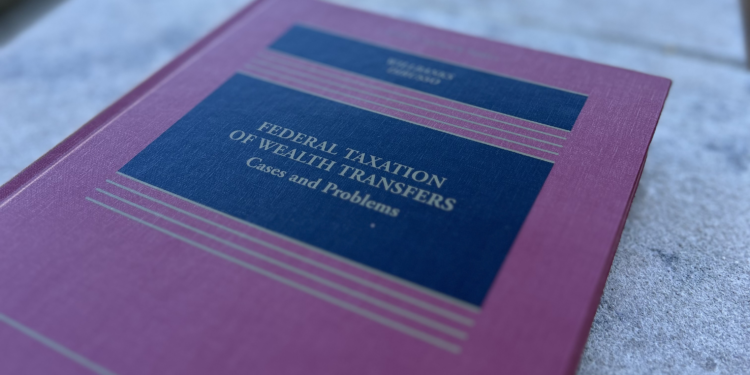In January 2024, Aspen Publishing released Law Professor Alyssa DiRusso’s latest book., titled “Federal Taxation of Wealth Transfers: Cases and Problems.” The book addresses the federal estate and gift taxes.
DiRusso worked as co-author to help revise the existing version of the book, which she had been using in her classes for many years.
“This one was particularly humbling for me because it was coming on board as a co-author for a textbook where I’ve used this book for a decade and a half,” said DiRusso.
Since she already used the book, DiRusso wanted to make sure to keep the character that made it an effective teaching tool.
“I love the book to begin with and I didn’t want to make it worse or detract from what the original author did that I thought made the book particularly special,” DiRusso said.
However, the book was in need of significant updates. The latest edition was published in 2015, and there was a major tax act in 2017. DiRusso reached out to the original author, Stephanie Willbanks, about working together on a revision and Willbanks agreed.
“She had looked at revising the textbook within the last couple of years, but didn’t want to go it alone, having been the only author of the textbook for its entire existence,” DiRusso stated.
DiRusso worked on the book during her semester-long sabbatical.
“The sabbatical was really critical; it would have been extremely difficult to make the progress that I did over a course of four months if I had been teaching at the same time,” DiRusso said. “I was grateful to have the time to be able to dedicate to my scholarship, even though that meant stepping away from the classroom for a semester.”
Blake Hudson, dean of Cumberland School of Law, spoke on encouraging faculty scholarship.
“Particularly in the legal space, you really want faculty to be a part of the national conversation on various law and policy issues because we get to very directly shape those law and policy issues as they arise and as they come to fruition,” Hudson said. “I’ve come in with an extra emphasis on making sure our faculty have the ability to pursue scholarship that they want to pursue, and that they have the ability to travel, to present that scholarship.”
Hudson compared Cumberland scholarship to that of other universities.
“It’s right up there with them. I know that our faculty scholarship is really well respected,” Hudson said.
He discussed DiRusso’s scholarship in particular.
“I know she’s contributing greatly to cutting edge questions, to try to help improve the law, to make it better, so that these tricky areas can be cleared up, and I’m sure her book is in that same vein,” he said.
DiRusso hopes that students are able to gain a practical grasp of how the law works from the book.
“I want my students using the book to understand not just what the law is but how lawyers use it,” DiRusso said. “I think it’s great when you get to think about what the law should be, but I think the more important skill for lawyers is understanding what it is and how to use it for your client’s advantage.”

News Editor




